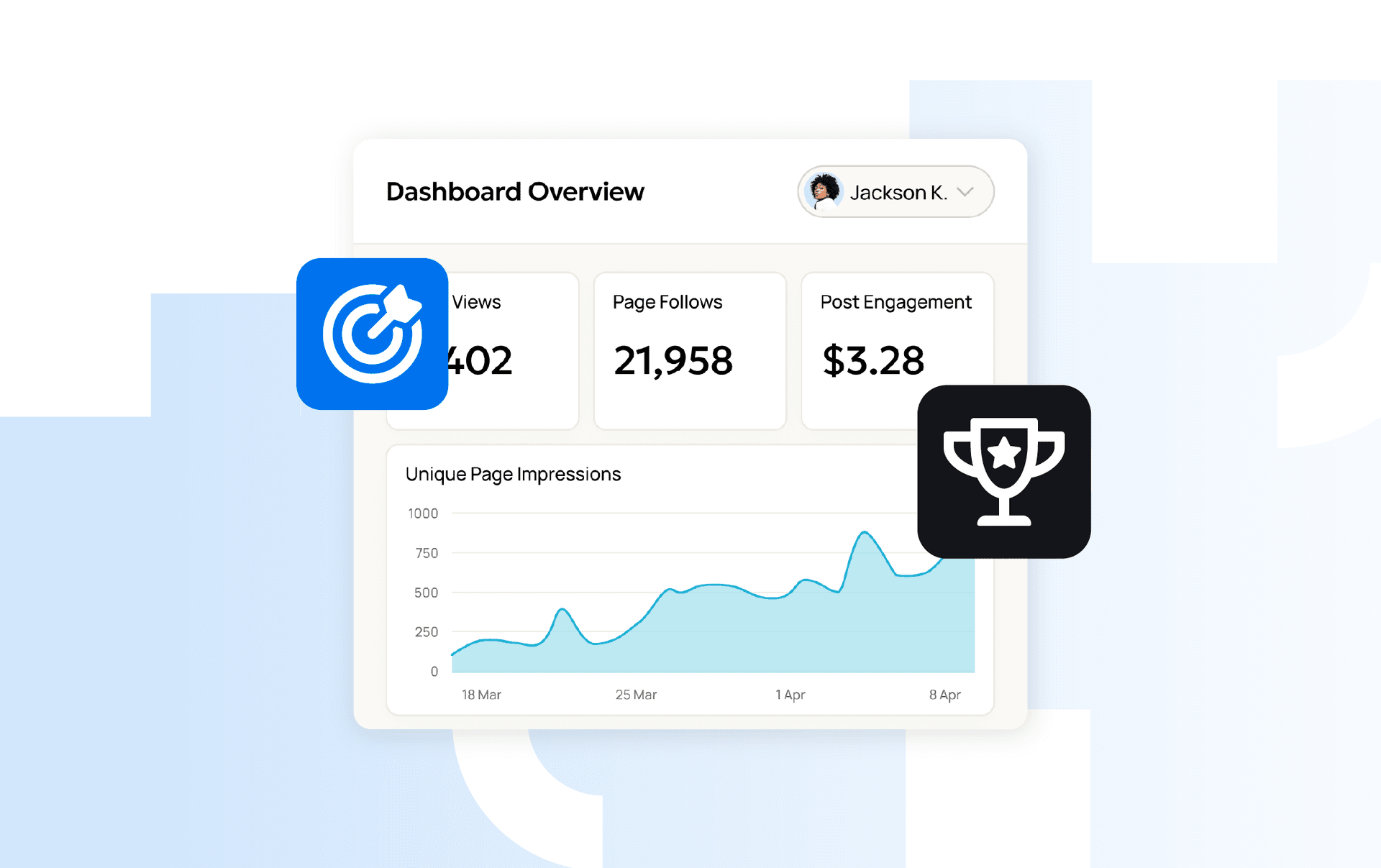Table of Contents
Table of Contents
- Do We Still Need Exit Interviews?
- Who Gets an Exit Interview?
- The Importance of Exit Interviews for Your Digital Agency
- Who Should Conduct an Exit Interview at Your Agency?
- When Is the Ideal Time To Conduct an Exit Interview?
- What’s the Best Way To Conduct an Effective Exit Interview?
- Topics To Discuss During Agency Exit Interviews
- Exit Interview Red Flags To Watch Out For
- What To Do With Exit Interview Data To Elevate Your Agency
- Make Exit Interviews Part of Your Brand
7,000+ agencies have ditched manual reports. You can too.
Free 14-Day TrialQUICK SUMMARY:
An employee exit interview provides valuable insights into the workplace from departing employees. It offers honest, constructive feedback, helping to identify areas for improvement and enhance employee retention. This article shares key topics to discuss during these interviews, emphasizing their importance for gaining actionable insights and maintaining positive relationships with former employees.
Parting ways with employees is never easy. Whether it’s a great colleague moving on to another opportunity or making the difficult call that someone isn’t suitable for your team, many of us would rather breeze right past the goodbyes and focus on backfilling that role and moving on.
But that’s a crucial error. Savvy agency owners know that there are lessons to be learned–even in the sticky, unpleasant, and downright frustrating situations that arise when current employees leave. And that’s why they weave exit interviews into their strategy as an employer. (In the same way that you should weave client exit interviews into your strategy as an agency.)
Exit interviews may not be fun, but to the well-prepared digital marketing agency, they can certainly be fruitful. You’ve got an agency to grow, so let’s dive in.
Do We Still Need Exit Interviews?
Yes! A thousand times, yes. An exit interview with your departing staff member is a golden opportunity–when it’s conducted correctly. You have the chance to get honest, constructive feedback on what’s working–and what’s not–at your agency from a knowledgeable source: someone who’s worked there. It's also an opportunity to wrap the relationship on a positive note, one that fosters two-way communication and a commitment to growth.
Who Gets an Exit Interview?
For some, the idea of an exit interview is sacrilegious; they reject it altogether. Some common excuses include:
“Why would I interview an employee who is quitting? They’re traitors!”
“We’re just too busy to focus on the past; we’re putting our energy into hiring and getting more clients.”
“I’d never give a terminated employee the opportunity to insult or sabotage this agency. They don’t deserve an opinion. They were let go for a reason.”
This reasoning seems logical at first glance, but it’s pretty flimsy.
Most exit interview best practices say everyone departing your agency should be interviewed. From the intern who is quitting to go live the #VanLife, to the middle manager who is being let go for underperforming, to the star account manager who is taking a promotion at another firm, current and future employees all have something to offer when their tenure ends.
You can’t know what insights might be revealed if you don’t initiate that conversation. If you practice a coaching mentality at your agency, exit interviews are a logical progression.
So, make it a policy. Make it a repeatable procedure. Make it a matter of principle that most departing employees– no matter how long they’ve worked for you, no matter what they were paid, no matter why they’re leaving–get an exit interview.
The Importance of Exit Interviews for Your Digital Agency
Imagine that one of your top employees hands in her notice. It’s a big loss, and it’ll affect some of your most important clients. You replace her and invest months training her replacement, only for that employee’s performance to tank overtime.
On and on the cycle goes, trying to plug this hole. You know the churn is killing your bottom line–but what you don’t know is that everyone in that role is doomed to fail, because their direct manager lacks key skills in emotional regulation and empathetic leadership.
The moral of the story is there are solvable challenges–big and small–all over your agency that you don’t know about.
Exit interviews offer one crucial avenue to uncover some of these problems. (On the opposite side of the same coin, exit interviews can also highlight what is working well, helping you confirm decisions or stay the course.)
You can use the information learned in exit interviews to:
Increase employee and client satisfaction
Improve company culture
Educate management and improve processes
Attract and retain top-tier talent
Decrease turnover rate
Reduce expenses related to hiring and training
Agency Tip: View exit interviews as having equal importance to hiring interviews and give them the time and resources they are due. As important as it is to find the right talent for the role, you should prioritize preparing for and conducting exit interviews to improve future relationships with employees.
Lastly, don’t forget that exit interviews not only benefit your digital agency tremendously, but they also benefit the departing employee. Exit interviews give the employee an opportunity to express their views and feel valued. It can make the difference between ending this professional relationship on a sour or sweet note. We’re all human. Everyone likes to feel heard; it’s a form of closure.
The biggest challenge was people. Not finding the right people, but ensuring that we had the right mix of people and then supporting their individual needs while staying focused on the company as a whole.
Yanira M. Castro, CEO, Humanity Communications Collective
Who Should Conduct an Exit Interview at Your Agency?
There is absolutely no point in holding exit interviews if you don’t make every effort to generate an honest and forthright conversation. For this reason, it is crucial that the exit interview is conducted by an unbiased third party. Ideally, someone from your HR team.
Many employees won’t be able to express themselves comfortably, openly, and honestly if they’re talking to their soon-to-be ex-manager or the intimidating CEO.
When Is the Ideal Time To Conduct an Exit Interview?
In all likelihood, the exit interview will be one of your company’s last interactions with this employee. The timing is crucial to create an environment where the person will be transparent and forthcoming. You want them to have prepared somewhat so that they’ve gathered their thoughts, and you don’t want them to be distracted, overly emotional, or checked out of the process.
Exit Interview Timing for Employees Departing by Choice
The ideal time to conduct an exit interview with an employee who is departing by choice is on their last or second-to-last day as an employee. Make sure not to leave it until the very last moment; if they are cleaning up their space or saying goodbye to colleagues, they won’t be in the ideal headspace for a productive conversation. The morning of their last day is likely the best time; this gives them time to return to their desk, say goodbye to their team, and pack up by the afternoon.
Agency Tip: Be sure to schedule the exit interview in advance at a mutually agreed upon time with the employee. Don’t spring it on them at the last minute. They are more likely to be candid and prepared for the conversation if they feel like the interview will be purposeful and meaningful–not that it was an afterthought or simply a checklist item.
Exit Interview Timing for Employees Being Terminated
Conducting exit interviews with an employee who is being terminated, downsized, or let go is a much more difficult matter. It may not be possible to interview them if they feel blindsided or become hostile. If you’re trying to swiftly get them to exit the building with minimal commotion, you have two options: give up on the exit interview altogether or try to initiate one at a later date (by phone or by email)–knowing full well you might get an unceremonious rejection.
However, there are some circumstances where the person being terminated is composed enough to participate in an exit interview. If this is the case, proceed! Don’t miss this golden opportunity.
If you’ve just let someone know that they’re losing their job, and they’ve agreed to an exit interview, try to switch gears from one discussion to the next. Give them a few minutes to compose themselves without going back to their desk. If possible, bring them refreshments, like water or coffee. It might be a good idea to have the departing employee begin with a survey before launching into the conversation.
Agency Tip: Don’t host the termination discussion in the manager’s office; instead, host it in a private meeting room. That way, the manager can step out when the termination discussion is over and the HR representative can step in. The departing employee never has to leave the room, which minimizes potential drama.
You may have to adjust your typical exit interview questions or style to match the unique context of the situation, but meaningful insights can still be generated, even from an employee who just got let go.
What’s the Best Way To Conduct an Effective Exit Interview?
There are a couple of simple options for conducting exit interviews, and each has their merits and drawbacks.
Face-to-Face
Phone or video call
Survey or questionnaire
Hybrid/combo questionnaire with interview
In-person interviews generally feel the most formal and personal, but this method may not be practical, particularly if your staff works remotely. Video conferencing can be a great alternative, but some of the nuances of communication, body language and facial expressions, are inevitably lost over video chat.
Some marketing agencies–particularly small ones without a dedicated human resources team–may choose to conduct exit interviews via survey. This feels impersonal, which can mean employees are less likely to put in effort to give detailed, helpful responses. However, it is efficient, and depending on the format of your survey, it can create data that is easy to compile and quantify.
The most comprehensive method is a hybrid model that starts with a survey or questionnaire and is followed up by an interview. This increases the range of information that you’re able to collect but is a greater burden of time and effort on both your part and the employee’s.
Topics To Discuss During Agency Exit Interviews
You’ll want to write and iteratively improve a list of exit interview questions that is right for your agency. Over time, create an exit interview template that can be used to keep the format and the questions consistent. To get you started, here are some topics that you should ask about directly or listen for as your departing employee opens up.
Topic | Watch Out For |
|---|---|
Reasons for Leaving | Is the employee leaving because of a recent merger, a specific team member, or better pay elsewhere? |
Company Culture and Values | Did the employee feel welcomed, included, and supported in the workplace? |
Processes and Change Management | Was the employee overwhelmed by micromanagement, or did they lack direction? |
Communication | Were there clear lines for reporting, or was the employee confused by mixed messages? |
Feedback, Reviews, and Professional Development | Did the employee receive regular feedback and reviews to support their development? |
Management and Leadership Styles | Did the employee enjoy working for their manager? Did they feel supported or discouraged? |
Policies and Working Conditions | Did company policies make the employee’s working conditions easier or more difficult? |
Role Description and Work | Did the original job description match the reality of the role? |
Compensation, Perks, and Benefits | Did the employee feel fairly compensated for the work they provided? |
Reasons for Leaving
Look out for information about how long they’ve been considering leaving, and if they can pinpoint exactly why they are resigning. You may be able to determine if there was a specific incident or change that occurred that instigated the beginning of the end (e.g. a merger, a new manager, employee turnover, etc.)
Listen for phrases such as:
“Since March, things have really gotten bad.”
“I’m not cut out to work at this pace.”
“We never say no to clients.”
Company Culture and Values
Do they describe the environment as relatively positive or negative? Are there norms or habits that made them feel as if they weren’t a strong fit for this team?
Listen for phrases such as:
“That’s just how it is here.”
“I don’t get it, but that’s how they’ve always done it.”
“I don’t feel part of this team.”
Processes and Change Management
Processes are crucial to scalability and quality. Does the structure of your agency empower people to do their best work? Or is everyone winging it? Be on the lookout for signs that the employee was frustrated with the existing processes or overwhelmed by the lack of them.
Listen for phrases such as:
“We’re always putting out fires.”
“There’s no room for flexibility.”
“It feels like nobody knows what they’re doing.”
Our focus on implementing systems and processes to manage growth has paid off. Not only are we delivering better results for our clients, but our employees are also more productive and satisfied in their jobs. This has allowed us to continue to grow and scale, while maintaining the values and culture that are so important to us.
Adam Binder, Founder and CEO, Creative Click Media
Communication
Do they think communication within your agency is honest and effective, or do they think there’s room for improvement? Communication is something virtually everyone harps on about–but on its own, this is a vague critique. Try to dig deeper to determine what’s at the heart of the issue. Is it a lack of clarity? Honesty? Accountability? Tools?
(For more about successful communication, read this.)
Listen for phrases such as:
“Sometimes my manager says one thing but then changes his mind later.”
“Nobody uses Trello like they are supposed to.”
“I want to be helpful, but I get so many Teams messages, I can’t do my work.”
Feedback, Reviews, and Professional Development
Try to ascertain if they felt that feedback and reviews were fair and helpful or if they seemed arbitrary or biased. Furthermore, some agencies skip performance reviews because they’re just “too busy”. If your agency is one of them, listen to hear if your departing employee felt frustrated by the lack of reviews–and therefore the lack of a clear path to career development.
Listen for phrases such as:
“Since I was hired, I never had a formal performance review.”
“I’m moving on because I want to take my career to the next level.”
“Some people on the team could do no wrong, while others went unseen.”
Management and Leadership Styles
As they say, “good employees don’t leave jobs. They leave managers.” It’s vital to ask questions about the employee’s experience working with management. At best, you’ll find out that your managers are professional, helpful, fair, and great to work for. If that’s the case, awesome! You know what to continue doing to keep that success going. At worst, you’ll gain some vital information about who needs more training to develop better leadership skills, who needs to consciously change their leadership style, or who needs to be moved into a non-supervisory role.
Listen for phrases such as:
“I just don’t click with [Manager Name].”
“I’m looking for a mentor in my next role.”
“I’d rather freelance, where I can have more control over what I produce.”
Policies and Working Conditions
This topic is vital since many of the issues that crop up here are set at the executive level. If you’re losing talent in droves and they’re all complaining about the mandatory three-days-in-the-office policy, you have the power to change that!
Listen for phrases such as:
“The commute is just unbearable.”
“I was looking for something that would better suit my lifestyle.”
“I prefer to work flex hours.”
Role Description and Work
When expectation deviates wildly from reality in a role, it’s a surefire way to break trust with an employee. Could it be that the role description doesn’t match the job itself? Does this role require different skills or interests?
Listen for phrases such as:
“When I started, I thought I’d be doing more client-facing work.”
“I thought this role would have more room for creative expression.”
“Right now, I wear so many hats, and I’m looking to specialize in a particular area.”
Compensation, Perks, and Benefits
While it may not be within your power to raise wages or hand out bonuses, it’s important to know if this is a motivating factor behind the employee’s departure. If you can find out what your competitors are promising, so much the better.
Listen for phrases such as:
“My starting vacation time at my new job is three weeks.”
“They’re offering a generous benefits package.”
“I’m getting a big raise.”
We attract high quality talent by offering competitive salaries, great personal and professional advancement opportunities, and amazing benefits. By focusing so much on the happiness of each individual employee, we ensure better outcomes for our clients as well. We know this people-first strategy works because our employee and client retention rate is incredibly high.
Graham Lumley, Director of Marketing, Blackhawk Digital Marketing
Areas for Improvement
Always give interviewees the opportunity to tell you directly how they think your agency could improve. You don’t necessarily have to act on their feedback, but it is the most direct way of finding out where there are wrinkles you could iron out.
Listen for phrases such as:
“If I had to pick something, I’d say...”
“Things are generally good, but...”
“I think we could get better at...”
Exit Interview Red Flags To Watch Out For
Of course, leveraging the insights generated from exit interviews takes plenty of common sense and good judgment. Watch out for these red flags and difficult situations:
Some employees may not be completely honest; they may fear retribution, a bad reference, etc.
Some employees may have opinions or perceptions that are drastically different from the majority of their colleagues.
Some employees may be hostile, rude, or unprofessional, particularly if they feel frustrated, scapegoated, victimized, or shocked.
Always remember, a lone employee’s opinion is not a fact. It’s an opinion. You’ll need to gather more evidence before you act. The important thing is to follow up, keep digging, and commit to change when you identify and confirm problematic patterns at your agency. What good is generating insights from exit interviews if you don’t act on them?
What To Do With Exit Interview Data To Elevate Your Agency
So, you’ve conducted your exit interviews, collected all that information, and now you’re sitting on a heap of data. What next? Well, it's like baking. You've got all your ingredients (data), but now it's time to mix them together into something delicious (actionable insights).
Start by identifying common themes—maybe it's a poor work-life balance or unclear career paths. Next, connect these themes to various aspects of your agency processes, such as onboarding, recruitment, and people management policies.
Recruitment and Hiring Practices
One of the most critical areas where the exit interview data will serve you well is in hiring practices. Use this goldmine to refine your recruitment process. For example, rethink interview strategies if your exit data reveals that people leave due to poor team dynamics. Maybe initiate a "team fit" segment to the hiring process, where prospective hires interact with potential teammates in a less formal setting.
And what about skills mismatch? If exiting employees mention they felt their skills were underutilized, it might be a cue to refine your job descriptions and qualifications. Make sure what you're asking for in the job posting accurately reflects the skills that will be used.
Simply put, let your exit interview data guide you in creating a more precise, transparent, and honest recruitment process that sets clear expectations from day one. This won't just help you attract candidates; it'll help you keep them.
Onboarding and Employee Experience
With the help of your exit interview data, find out if your onboarding process provides a lasting good impression or if it fizzles out like a flat soda. Exiting employees may offer feedback on what elements of the onboarding process felt unnecessary or what additional information they wish they had received.
If you've heard from exiting employees that the onboarding process is like drinking from a firehose—too much information, too fast—it's time to streamline. Break down your training sessions into bite-sized modules that are easy to absorb and include some interactive elements.
On the flip side, what if the feedback indicates an underwhelming onboarding process? Integrate real-world projects and immediate team introductions to make newcomers feel like they're part of something impactful from day one.
The aim is to transform your onboarding from a cumbersome necessity into a positive experience that prepares new hires for what lies ahead.
People Management and Policies
Great employees leave managers, not companies—or so the saying goes. Exit interviews can be particularly enlightening when it comes to understanding the role of management in an employee's decision to leave.
If the word "management" or–even worse, ”micromanagement”--pops up repeatedly in your exit interviews, it's time to perk up those ears.
Or, let's say a recurring issue is a lack of communication between team members and managers. One practical step here could be to introduce regular one-on-one check-ins that focus not just on tasks but also on well-being and career development.
Take this chance to receive constructive feedback on managerial practices and make necessary adjustments. While you’re at it, look for ways to improve employee engagement and job satisfaction based on this feedback.
Feedback Loop With Current Team
Last but definitely not least, share generalized insights with other employees. An open culture where people see their concerns addressed can do wonders for overall job satisfaction. Plus, everyone appreciates an agency that listens, adapts, and grows.
Employee engagement doesn't just magically happen. Use the exit interview data to gain and share insights into where in the employee lifecycle you're losing people’s interest. Take these cues as an indication that your agency could do better at keeping its staff excited and motivated. Engaged employees typically equal high-performing employees, so it's worth the effort to connect the dots here.
Make Exit Interviews Part of Your Brand
It takes a certain level of humility as an agency to be open to the possibility that you could learn from your ex-employees. But the world isn’t black and white, and neither is growing and scaling a digital marketing agency. A person can be leaving your agency and still have interesting perspectives about how your business runs that can improve employee retention in the future.
Make exit interviews a part of your brand as an employer; with a little good judgment and a commitment to follow through, you stand only to gain.

Written by
Elyse Gagné develops branding and content strategies that unite businesses with their customers. A podcast junkie, you'll find her learning about the latest technologies and brand storytelling techniques while she gardens or hikes.
Read more posts by Elyse GagnéSee how 7,000+ marketing agencies help clients win
Free 14-day trial. No credit card required.






